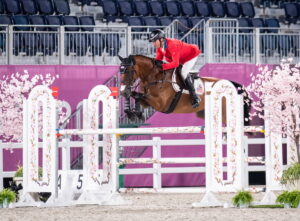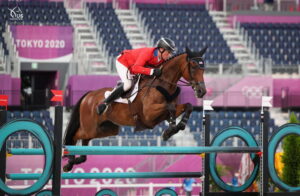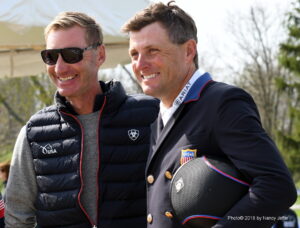There’s no way around it.
The outcome of the Olympics for the U.S. eventing team was disappointing.
When I made my predictions, I didn’t think the squad would reach the podium, but there was always a chance it would come close.
So it was a blow to watch the U.S. finish sixth of 15 teams on 125.80 penalties, while the gold medal British (the only contingent in the Tokyo competition to have less than 100 penalties) ended on 86.30, an Olympic record for a winning eventing team.
This was the first Olympic eventing competition run without teams having a drop score, and three on a team, all scores to count, made it hard to handicap. All the key teams except the British wound up having to change their proposed line-ups before the Games got under way.
As Britain’s Oliver Townend, the world’s number one-ranked eventer noted, the odds of his country having three top horses and three top riders for them at the right time was quite something. Having that happen definitely is a challenge in a sport with three distinct phases, and Britain hadn’t taken gold in nearly half a century since last doing it in 1972, when their riders followed on their team gold at the 1968 Games.
The U.S. has not won a team eventing medal at the Olympics since 2004, and more recently, was eighth of 16 teams at the 2018 FEI World Equestrian Games.
But Phillip Dutton, who has ridden for both Australia and the U.S. in the Games over the course of three decades, advised to “keep it all in perspective. It’s been an improvement from the team point of view for the U.S. We’re on the board and certainly you can always try to do a bit better. We were aiming for more, but it’s not horrible.”

Phillip Dutton and Z. (Photo courtesy of U.S. Equestrian)
Added Phillip, who won individual bronze at the 2016 Olympics, “It’s the Olympic Games, so you’ve got to be at your best. There’s a couple of things in dressage that didn’t go right, and we had a little bit of time (penalties) yesterday (on cross-country). Everything’s got to go right on the day, and we probably didn’t quite do that.”
Then today, although all three team members made the cut and got into the individual medal competition, none of them had a clean round. Doug Payne, riding Vandiver in his first Olympics, did the best, with one rail down in each round to end up 16th. Doug also regularly competes in grand prix show jumping, which could be a factor in that performance.

Doug Payne and Vandiver. (Photo courtesy of U.S. Equestrian)
Phillip had two rails in each round with Z to end up 21st.
“Unfortunately, I think Z really was feeling the effects of yesterday (the cross-country),’ Phillip stated.
“He didn’t jump quite as well as I would have liked to have done.”
Boyd Martin’s ride, Tsetserleg, dropped a pole and collected time penalties in the first round, then had three rails gone in the second. He was 20th.
There has been a huge effort to improve the U.S. results. Olympic and world championships show jumping medalist Peter Wylde was hired to coach the riders in his sport.
Proficiency in both dressage and show jumping are key, because they can offer a relatively controllable baseline, compare to cross-country, where so many often-unexpected challenges await.
Eventing Performance Director Erik Duvander, who has competed for his native Sweden and coached the New Zealand team, has been tireless in his efforts.
He emphasized that “In all of my years of competing and coaching in championships in this sport, I have never experienced such an arduous trip for the horses.”
Before coming to Tokyo, the horses quarantined and trained in Aachen, Germany.
“Our team handled the process without doubt and ultimately kept the welfare of our horses at the forefront of every decision. Our team truly showed their mettle on the cross country yesterday. The horses gave their absolute all on the final day in show jumping and tried until the end with everything they had left,” said Erik.
“Our grooms and staff who have worked so meticulously to care for these horses deserved a better result. It has been an extraordinary effort across the board since we left the U.S., from everyone on the long list — the reserve combinations who traveled to Germany and those who participated at the Mandatory Outing (in Virginia). Everyone has fronted up for the U.S team and done everything within their power to support our success. I have a great belief in the future of the U.S., as I know we are on the right track.”
He pointed out that when he assumed his job in the fall of 2017, he had little time to prepare horses and riders for the WEG. They weren’t ready, he has said, and everyone was hard at work to turn that around. I saw it at every event I covered over the last few years.

Boyd Martin and Eric Duvander.
As Boyd emphasized, “Eric Duvander absolutely gave his heart and soul to making America great again, no one sacrificed more than Eric to do what he’s done the last couple of years.”
Reflecting on his competition time in Tokyo, Boyd noted, “I’ve been dreaming of doing well at this. I came up a little bit short from what my hopes were.”
Added the veteran now of three Olympics, “Saying that, this is the best in the world and we’re not far off.”
Doug, who called riding in the Games “a huge honor,” felt his horse had done his best.
“You can’t ask for a whole lot more from him. He’s shown a lot of heart and I’m certainly thankful to have him.”
Even so, Doug noted about the outcome, “It’s frustrating still. It’s annoying.”



